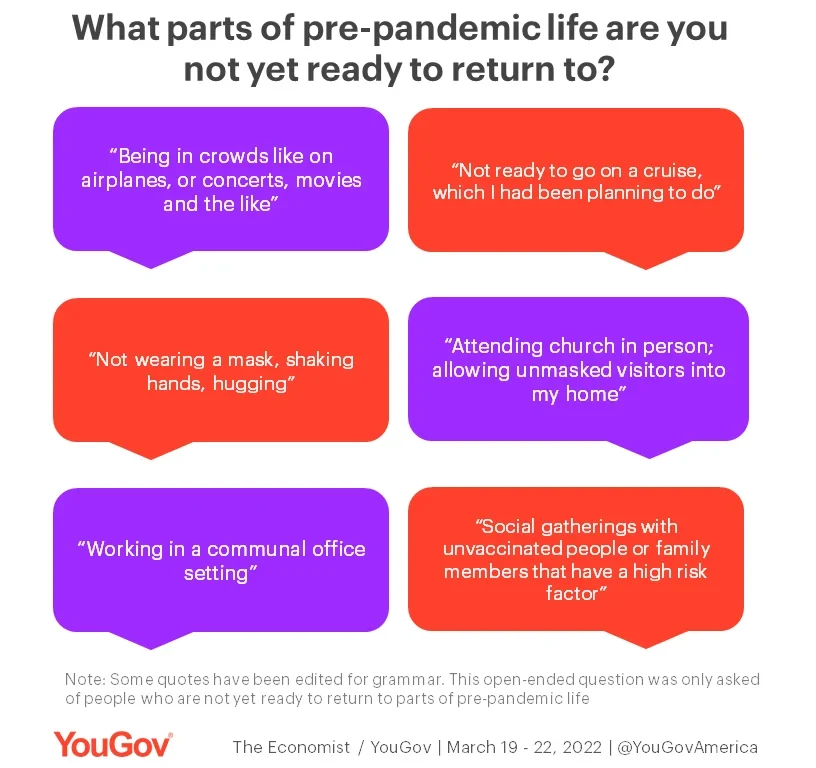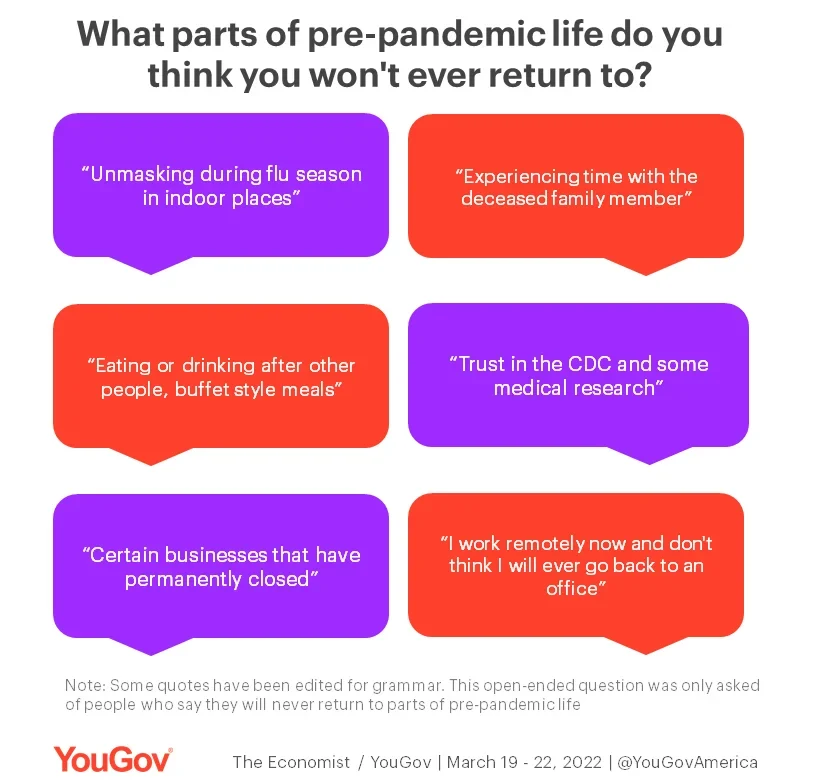Two years after the United States first paused or limited many activities to prevent the spread of the COVID-19 pandemic, the Economist/YouGov Poll suggests most Americans are optimistic about the end of the pandemic – but some are taking only tentative steps toward returning to normal.
A little more than half of Americans see COVID-19 cases declining nationally (53%, compared to 15% who say cases are increasing) and in their communities (51%, compared to 10% who say it is increasing). A similar proportion of Americans now say that the worst of the COVID-19 pandemic is behind us in the U.S. Just 14% of Americans say the pandemic will get worse, while 10% say we are currently in the worst of it. Republicans (68%) are especially likely to say the worst is over, but 54% of Independents and 45% of Democrats also say so.
With so few Americans seeing cases increasing or expecting things to get worse, it’s little surprise that 79% of Americans say they are ready to return to normal from the COVID-19 pandemic. But 38% of Americans say there are parts of life from before the pandemic that they are not yet ready to return to — including 32% of people who are ready to return to normal. For many of the people who are not yet ready to include aspects of pre-pandemic life, this includes large crowds, certain types of travel, and close contact with people, according to those who responded to our follow-up, open-ended question.

About three in 10 Americans (31%) — including 29% of those who are ready to return to normal — say there are parts of life from before the pandemic that they will never return to. When asked what those activities are in an open-ended question, many say they will never again attend large gatherings, go to crowded concerts, or forgo protective face masks. Others talk about moments they’ll never have with loved ones who died during the pandemic, such as personal or family milestones they will never get to experience as they once could have.

Most people who before the pandemic did activities that involved close contact with large groups of people — such as airplane travel, attending concerts, taking public transportation, and going on cruises — say they are comfortable doing the activities now. But a significant share of Americans who used to do each activity remain uncomfortable resuming these elements of their pre-pandemic life.
For some activities, such as airplane travel and concert attendance, vaccinated Americans are less comfortable returning to the activity than unvaccinated Americans. Older adults are less comfortable resuming activities than younger ones, and women are less comfortable than men.
To see how far Americans have come from the early days of the pandemic, we revisited a question about travel and found an increase in comfort with — and plans to — travel, with significant residual concerns. Many Americans think travel gets less safe, the further away from home it takes them. While only 13% of Americans view travel within their hometowns within the next three months as unsafe and 15% say the same about travel to neighboring communities, 18% say it is unsafe to travel across state lines.
One in four (24%) believe it’s unsafe to travel to different regions of the country, and 39% believe it’s unsafe to travel abroad. The patterns were similar when we asked the same question two years ago, but with a far greater share of Americans viewing travel as unsafe.
More than one-third (37%) of Americans say they plan to travel anywhere in the next three months, more than double the level of 15% when we asked Americans in March 2020.
See the toplines and crosstabs from this Economist/YouGov Poll, and explore the Economist/YouGov poll from March 22 - 24, 2020
Methodology: The Economist survey was conducted by YouGov using a nationally representative sample of 1,500 U.S. adult citizens interviewed online between March 19 - 22, 2022. This sample was weighted according to gender, age, race, and education based on the 2018 American Community Survey, conducted by the U.S. Census Bureau, as well as 2016 and 2020 Presidential votes (or non-votes). Respondents were selected from YouGov’s opt-in panel to be representative of all U.S. citizens. The margin of error is approximately 3% for the overall sample.
Image: Pexels













